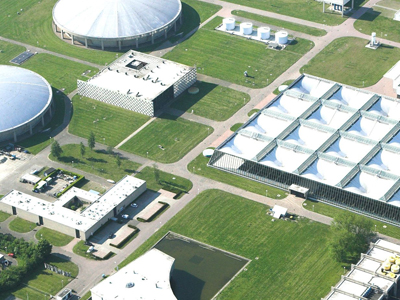Overview
Course video
Water is a crucial element in climate and for society. Find out about the latest engineering interventions for water management in rivers, coasts and the urban environment.
Water is essential for life on Earth and of crucial importance for society. Water also plays a major role in affecting climate. Its natural cycle, from ocean to atmosphere by evaporation, then by precipitation back to land returning via rivers and aquifers to the oceans, has a decisive impact on regional and global climate patterns.
For those interested in engineering, climate science and environmental studies, this course offers a first introduction to the physics of water systems and their role in climate. In addition, we show you the state-of-the-art engineering interventions that can be applied to water systems. These can improve coastal safety and increase the availability of water supplies worldwide.
The course welcomes students from all over the globe, so we actively encourage discussion of water and climate issues you may experience in your location, now and in the coming decades.
After taking this course, you will be able to:
- Understand the different processes at play in the global water cycle.
- Identify and describe the flows of water and sand in different riverine, coastal and ocean systems.
- Identify mechanisms of climate change and explain the interplay between climate change, sea level, clouds, rainfall and future weather.
- Explain why, when and which engineering interventions are needed in rivers, coastal and urban environments.
- Explain why water for food and water for cities are the main challenges in water management and propose solutions.
- Explain and confront the challenges in better understanding and adapting to the impact of climate change on water over the coming 50 years.
The course consists of knowledge clips, movies, exercises, and exam assignments. There are opportunities to discuss course materials with your fellow students and the Course Team through our online forum. We also provide interactive feedback video sessions in which the lecturers discuss issues raised by students.
Delft University of Technology (TU Delft) has a unique reputation when it comes to water and climate, with faculty experts in the fields of climate research, water management and hydraulic engineering. The course introduces you to many aspects of water and climate: from the micro scale of raindrops to the macro scale of oceans, and from understanding the physics of the different water systems to practical engineering solutions that may help societies adapt to the present and future impacts of climate change on water.
What you'll learn
- The different processes of the global water cycle
- The challenges in better understanding and adapting to the impact of climate change on water for the coming 50 years
- The flows of water and sand in different riverine, coastal and ocean systems
- How to identify mechanisms of climate change and explain the interplay of climate change, sea level, clouds, rainfall and future weather
- Why, when and which engineering interventions are needed in rivers, coasts and urban environments
- Why water for food and water for cities are the main challenges in water management and what the possibilities and limitations of reservoirs and groundwater are to improve water availability
Water XSeries
Together with the courses "Drinking water treatment" and "Urban Sewage Treatment" this course forms the Water XSeries, from the Faculty of Civil Engineering and Geosciences at TU Delft.
Details
License
Unless otherwise specified, the Course Materials of this course are Copyright Delft University of Technology and are licensed under a Creative Commons Attribution-NonCommercial-ShareAlike 4.0 International License.
Qualifications
Chartered Engineering Competences
All our online courses and programs have been matched to the competences determined by KIVI’s Competence Structure, a common frame of reference for everyone, across all disciplines, levels and roles.
These competences apply to this course:
- A1: Extend your theoretical knowledge of new and advancing technologies.
- E3: Undertake engineering activities in a way that contributes to sustainable development and a circular economy.
Admission
This is a Massive Open Online Course (MOOC) that runs on edX.
Prerequisites
Secondary school (high school) algebra; basic mathematics concepts.


